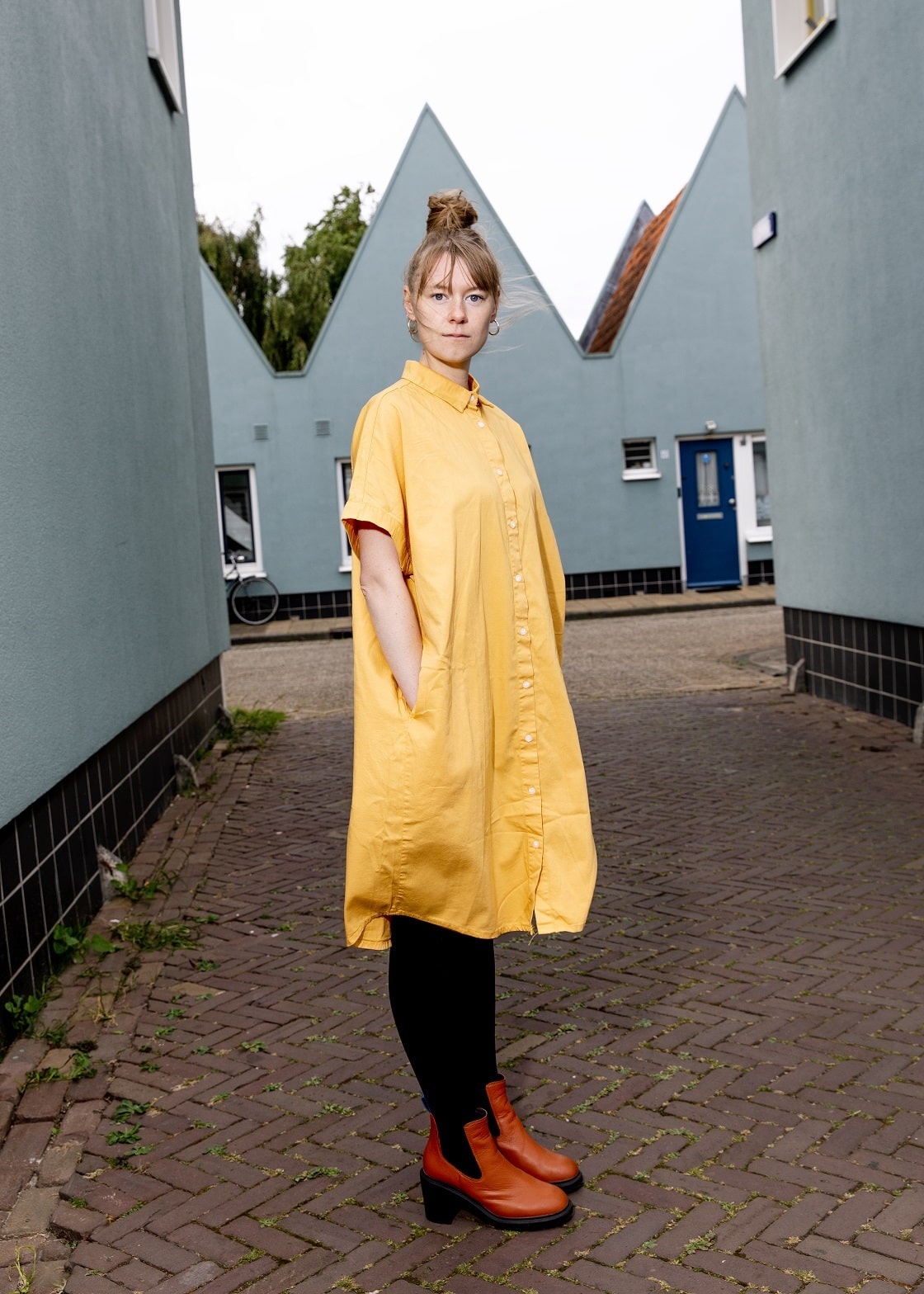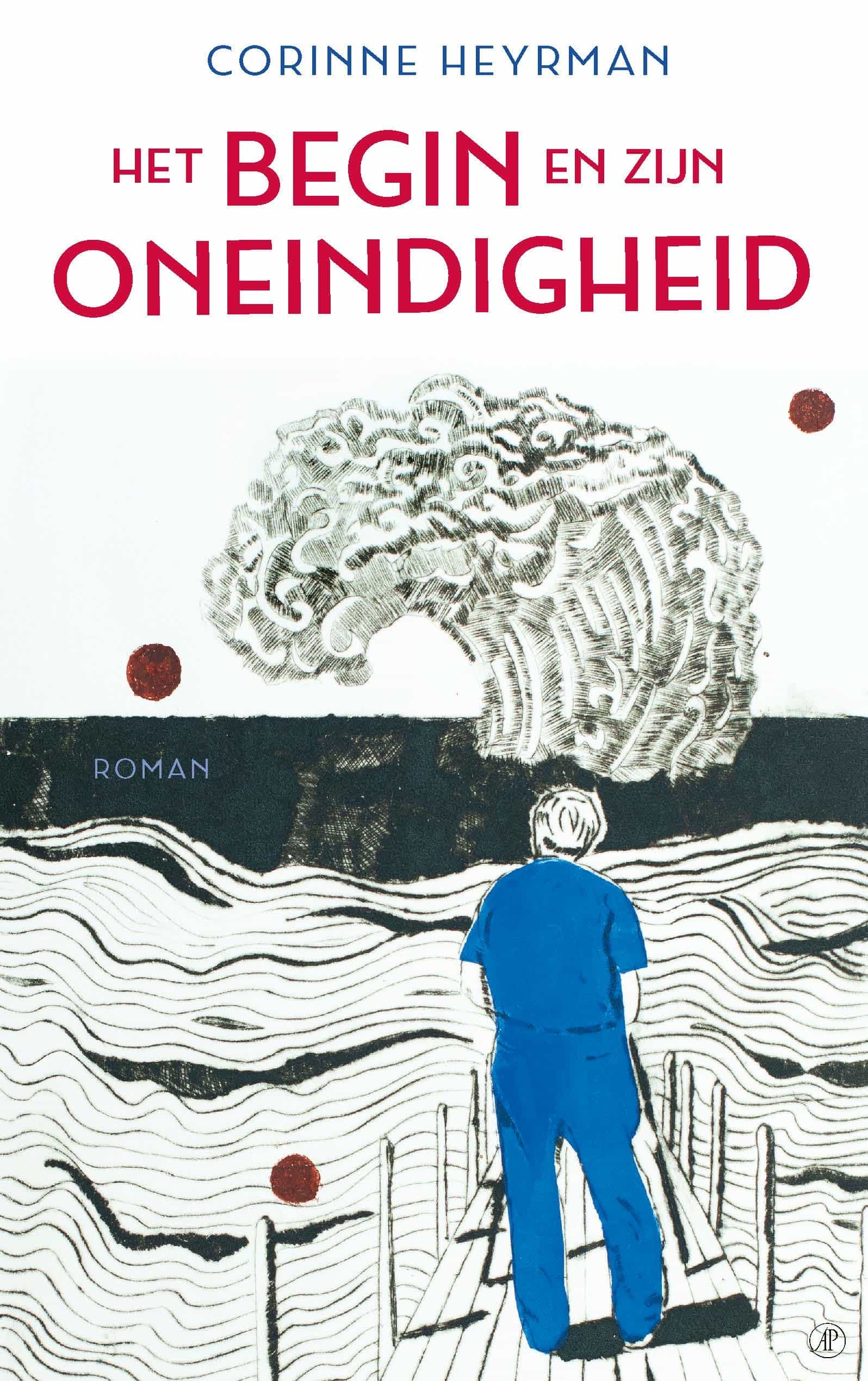‘Het begin en zijn oneindigheid’ by Corinne Heyrman: The Right to Be Vulnerable, to Be Different
When her grandfather is admitted to a psychiatric ward, a young woman mulls her own past there. A gripping novel about mental fragility.
“People, you can’t fathom them…” The Belgian writer Gerard Walschap’s famous quote features as a motif in the debut novel by author Corinne Heyrman (b. 1991), Het begin en zijn oneindigheid (The beginning and its endlessness). Heyrman, originally from Antwerp, is now based in Eindhoven, where she produces podcasts and theatre shows.
 Corinne Heyrman
Corinne Heyrman© Lin Woldendorp
In the novel, the anonymous-I narrator makes podcasts too. When the narrator’s grandfather is admitted to a psychiatric hospital, she decides to make a radio documentary to make sense of it. She speaks with doctors, with her grandmother and mother, and with her grandfather Marcel’s friends from the brass band in which he used to play the trumpet. We often encounter the narrator with recording gear at the ready, or in front of her computer trying to assemble her recordings into a coherent story. She wants to capture and preserve the undesired transformation of her grandfather into sound.
This is a suitable metaphor for life itself because we so crave a story for ourselves, and for others. That provides an anchor, provides clarity. But life is full of painful obstacles, which sometimes lead us astray, whether or not to a psychiatric ward. The narrator experienced this herself at 17, when she was admitted with anorexia, the eating disorder that consumed her till she shrank to near invisibility.
Life is full of painful obstacles, which sometimes lead us astray, whether or not to a psychiatric ward
The experiences she had then helped her to understand her grandfather better. Heyrman clearly knows her subject: she writes strikingly about what it is like to sink into a depression, to be different, even if only temporarily, what it is like to be misunderstood, to take leave of life, disappointed and lonely. Dying with regret seems to the narrator like the most painful thing of all. With “the name of a disappointed man in her throat”, she looks at her grandfather’s trumpet that she smuggled from his attic to her bookcase. And she is furious with a world that does not want to understand what her grandfather is going through. A world that doesn’t understand what it is like to live with a disorder that is part and parcel of who you are. A condition, a vulnerability that unlike a ‘normal’ disease never goes away, but stays with you forever, “like a sneaky fox or a dangerous tick”. Depression is a darker version of being in love: you cannot see it, you can hardly describe it, but you do sense it.
Depressed trumpet
She tries to blow several notes on the trumpet, her tentative attempts to produce music from the instrument become the soundtrack for her podcast. But it doesn’t really work, the trumpet has a mind of its own, refuses to play certain notes, as if it too suffers from depression. A perfect common thread for her audio story about Marcel.
Meanwhile, she has philosophical debates with her boyfriend, “the non-practising Communist”, an artist who holds a mirror up to her, but who also brings balance to her life and to the podcasts she makes. Used to being interviewed, knowing exactly what to say and when, he provides moments of relief, which chime with the humorous comments of the narrator about everything that is happening.
The book, despite its theme, is full of humour. It is there in the details
The book, despite its theme, is full of humour. It is there in the details, in sentences such as “it was an expensive hobby, to recover from an invisible illness”, after the observation that the junior ward is populated only by white girls from the upper and middle classes. Or when – suspecting her grandmother of playing a role in her grandfather’s depression – the narrator comments, “Like a CEO, my grandmother is only normal in her presentation”. Not only is it funny, it is also a strong image, and there are plenty of these in the book. Like how, when trying to spruce up a hospital room with bunting and balloons for a birthday party, it achieves the opposite effect.

All this makes Het begin en zijn oneindigheid (The beginning and its endlessness) a very strong debut. Out of the memories of her youth, philosophical reflections, and all manner of associations, Heyrman constructs a unique universe, a bit like the workings of an overcrowded but depressed brain. Thus, the writing style connects beautifully with the theme.
At the same time, it is a tale about how the world treats people with mental vulnerabilities. There are those who look inward, and those who look around them, or as Elias Canetti puts it: the people who look at the sea, and those who swim. How you are will partly determine how you view other people’s vulnerabilities. The non-practising Communist doesn’t really believe in this dichotomy. He thinks one should no longer talk about Confused People, but about confusing people, or people with misunderstood behaviours. Then it would become a societal issue, goes the reasoning. Food for thought, certainly, because if you look for a simple explanation for something as complex as mental vulnerability, or you rely on simplistic mantras such as “where there’s a will there’s a way” or “everything will be fine”, you may well wind up at a dead end.
Excerpt of ‘Het begin en zijn oneindigheid’, as translated by Elisabeth Salverda
At the park entrance gate was a sign displaying the aims of the sculpture park: to stimulate alienation in a natural environment and to draw people out of their comfort zone. If you came here from a psychiatric ward, all the sculptures simply seemed normal. That rocket over there, that was me. Crashing into a quietly rippling pond was my way of life too.
Each week we sat there in silence. Everyone who visited me gave advice, especially just to eat well, as if that was something I hadn’t thought of yet. Everyone talked a lot, my mother in particular. Not him. He sat next to me and looked at the rocket. He didn’t mind if I didn’t want the croissant he offered me every week. He just nodded, “Maybe next time”.
The rocket is still in mid-descent, bold or unswerving, there are children playing in the shallows, we could sit again, here on a bench. I don’t know whether I would accept a croissant just like that, it wouldn’t fit into my schedule, afterwards, it would weigh too heavy on my stomach, the grease would stick to my hands, a dirty feeling of weakness. Is that being sick? Is that recovery? Something in between?
I could ask my grandfather if he knows what has upset him. Whether it was because of his twin brother, but why now? In my memory, my grandfather spoke of him as a beloved and great man. “My real other half,” he called him, at which my grandmother would look up angrily (pretend or real) and he would wink at the others in the room (definitely pretend). There was no jealousy in the way he spoke of his twin. I remember sitting on my grandfather’s lap while he showed me pictures of both of them, two identical men. Wiggling on his knee, I pointed out “the real one”, as I called him, as if his twin brother were fake. Over and over I pointed to one of them and shouted that one must be the real one, this grandfather, this one for sure. The louder I yelled, the more correct the answer was, was my theory, but it didn’t seem to work. I kept pointing out his twin brother by mistake. My grandfather laughed so hard he cried. He lifted me up, put me down on the rug by his feet and told me about the sparrow eggs they used to steal from the nests in the gutter. They kept their haul under their caps so as to hide it from view. Their father saw them coming down the ladder and asked what they were doing. When his
twin brother replied that they had been checking the gutter, their father patted their caps encouragingly. Good boys, he said. The slippery egg white ran down their faces. Their father had had a good laugh and so had my grandfather, later, with his grandchild opposite him.
I could ask whether he felt useless because of the new supermarket, which made him sink into even greater futility after retirement. He could tell me if my grandmother tyrannized him, if she had secretly locked the door to the grocery when my grandfather announced he wanted to keep working. He did not want to retire, the shop was his life, without it he would walk around blindly, he would be a man without qualities. He could tell me that his friends from the brass band no longer wanted to see him, that he no longer belonged at the morning market.
I could understand him then, but I haven’t for the past few months. Every visit I don’t know how I will find him. Every time a different grandfather. Silent, gruff, angry, sweet, or subdued. He could gaze at the sky and put it into words, he could find relief in the playful art around us. We could look at the wonderful families, the young mothers and fathers and their offspring on garish picnic rugs, with lavish spreads like at a reception – the park does not want to confuse these people, not at all, the park wants to go along with the ideal day trip of the model family. The soft park with its expansive lawns and flower beds wants to be anything but uncomfortable. The happy families fit in here better than we do, two difficult people who are indefinable. We could sit, here on the bench in the sculpture park. I could say, “That rocket, that’s us.”
Corinne Heyrman, Het begin en zijn oneindigheid (The beginning and its endlessness), De Arbeiderspers, Amsterdam, 2022, 232 pages












